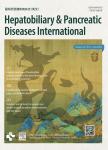Ischemic preconditioning enhances hepatocyte proliferation in the early phase after ischemia under hemi-hepatectomy in rats
Ischemic preconditioning enhances hepatocyte proliferation in the early phase after ischemia under hemi-hepatectomy in rats作者机构:Department of General Surgery First Affiliated Hospital Zhejiang Chinese Medical University Hangzhou 310006 Hangzhou China Intensive Care Unit First Affiliated Hospital Zhejiang Chinese Medical University Hangzhou 310006 Hangzhou China Key Laboratory of Combined Multi-organ Transplantation Ministry of Public Health Key Laboratory of Organ Transplantation Zhejiang Province and Division of Hepatobiliary and Pancreatic Surgery First Affiliated Hospital Zhejiang University School of Medicine Hangzhou 310003 Hangzhou China
出 版 物:《Hepatobiliary & Pancreatic Diseases International》 (国际肝胆胰疾病杂志(英文版))
年 卷 期:2012年第11卷第5期
页 面:521-526页
核心收录:
学科分类:1002[医学-临床医学] 100210[医学-外科学(含:普外、骨外、泌尿外、胸心外、神外、整形、烧伤、野战外)] 10[医学]
基 金:supported by grants from the National Basic Research Program of China(973 Program)(2009CB522403) the National Key Technology R&D Program (2008BA160b02) the National S&D Major Project(2008ZX10002-026) the Projects of the Ministry of Public Health(200802006) the Special Foundation for Young Scientists of Zhejiang Province Traditional Chinese Medicine,China(2011ZQ008) the Medical Scientific Research Foundation of Health Bureau of Zhejiang Province,China (2012KYB143)
主 题:reperfusion injury ischemic preconditioning hepatocytes proliferation hemi-hepatectomy
摘 要:BACKGROUND: Ischemia/reperfusion (I/R) injury is an important barrier to liver surgery and transplantation because it impairs remnant liver/reduced-size-graft regeneration. Ischemic preconditioning (IPC), as an effective measure to overcome I/R injury, has been shown to enhance the regenerative capacity of hepatocytes. However, investigations have always focused on regeneration in the late phase after reperfusion. This study aimed to investigate whether IPC enhances hepatocyte proliferation in the early phase after reperfusion and possible underlying mechanisms. METHODS: A total of 90 rats were divided into three groups: hemi-hepatectomy alone (PHx group), 60 minutes of ischemia plus hemi-hepatectomy (I/R group), and a cycle of 10 minutes of alternating I/R prior to 60 minutes of ischemia plus hemi-hepatectomy (IPC group). Each group was divided into five subgroups sacrificed after 0.5, 2, 6, 12 or 24 hours (n=6/ subgroup). Subsequently, serum concentrations of alanine aminotransferase (ALT), aspartate aminotransferase (AST), tumor necrosis factor-alpha (TNF-α), and interleukin-6 (IL-6) were measured; caspase-3 and proliferating cell nuclear antigen (PCNA) proteins were also determined by Western blotting. Furthermore, PCNA was detected by immunohistochemistry to identify the expression ***: Serum ALT and AST levels after 2-24 hours of reperfusion in the PHx and IPC groups were remarkably decreased compared to the I/R group, and the serum TNF-α was relatively lower. A significant increase of serum IL-6 levels was found in the PHx and IPC groups compared with the I/R group at each time point. Furthermore, PCNA expression was remarkably increased in the IPC group after 6-12 hours of reperfusion, and in the earlier 0.5 and 6 hours time points after reperfusion have shown the massive PCNA-positive hepatocytes. At the same time, the expression of liver p-JNK was higher in the IPC group in the early phase after reperfusion than that of the I/R group and its expre



